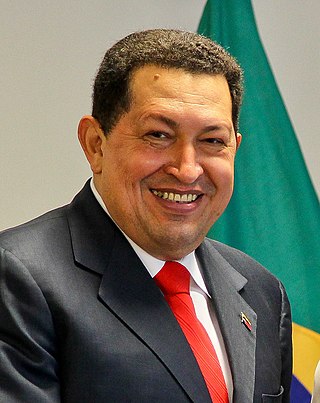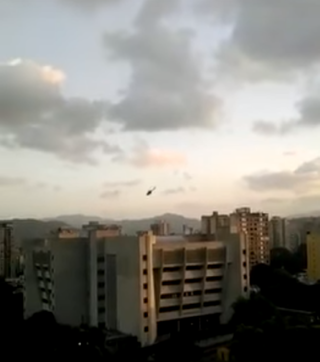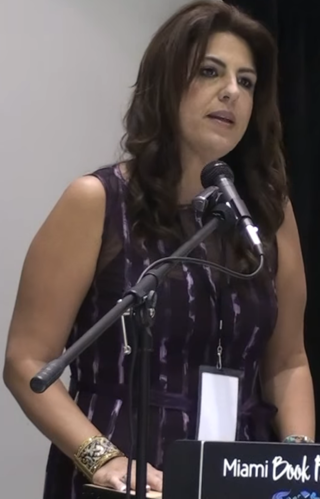
Hugo Rafael Chávez Frías was a Venezuelan politician and military officer who served as the 52nd president of Venezuela from 1999 until his death in 2013, except for a brief period of forty-seven hours in 2002. Chávez was also leader of the Fifth Republic Movement political party from its foundation in 1997 until 2007, when it merged with several other parties to form the United Socialist Party of Venezuela (PSUV), which he led until 2012.

The Bolivarian Revolution is an ongoing political process in Venezuela that was started by Venezuelan President Hugo Chávez, the founder of the Fifth Republic Movement and later the United Socialist Party of Venezuela (PSUV), and his successor Nicolás Maduro. The Bolivarian Revolution is named after Simón Bolívar, an early 19th-century Venezuelan revolutionary leader, prominent in the Spanish American wars of independence in achieving the independence of most of northern South America from Spanish rule. According to Chávez and supporters, the Bolivarian Revolution seeks to build an inter-American coalition to implement Bolivarianism, nationalism and a state-led economy.

A failed coup d'état on 11 April 2002 saw the president of Venezuela, Hugo Chávez, ousted from office for 47 hours before being restored to power. Chávez was aided in his return to power by popular support and mobilization against the coup by loyal ranks in the military.
The Daktari Ranch affair was a hypothesized plot to overthrow Hugo Chávez, who was the President of Venezuela. According to Chávez and his supporters, the capture of several dozen individuals in May 2004 and other developments prove the existence of the purported coup plot, while the anti-Chávez opposition discounts the notion that any deeper meaning can be imputed to the raid and capture of the Colombian detainees or to other events.

Since 2 February 1999, Venezuela has seen sweeping and radical shifts in social policy, moving away from the last government's officially embracing a free-market economy and liberalization reform principles and towards income redistribution and social welfare programs.

Alfredo Antonio Peña was a Venezuelan journalist and politician.

Henrique Capriles Radonski is a Venezuelan politician and lawyer, who served as the 36th Governor of Miranda from 2008 to 2017.

The RCTV protests were a series of protests in Venezuela that began in the middle of May 2007. The cause of the protests was the decision by the government to shut down Venezuela's oldest private television network, Radio Caracas Televisión (RCTV), refusing to renew its broadcasting license and instead creating a new public service channel called TVes, which began operations on 28 May, the same day RCTV's license expired. RCTV had Venezuela's largest viewing audience, with 10 million of the country's 26 million people viewing its shows and soap operas.

X-Ray of a Lie is a 2004 documentary film examining another film, The Revolution Will Not Be Televised about the events of the Llaguno Overpass events, before the 2002 Venezuelan coup d'état attempt. The X-Ray documentary, directed by Wolfgang Schalk and written by Schalk and Thaelman Urgelles, accuses Kim Bartley and Donacha O'Briain of omissions and distortion in The Revolution Will Not Be Televised. It premiered on DVD in Venezuela in July 2004.
Noticiero Digital is a Venezuelan news and opinion website headquartered in Caracas, described by Reporters Without Borders as "a popular website that is critical of President Hugo Chávez". According to its former editor, Roger Santodomingo, Noticiero Digital became popular after the government of Venezuela decided not to renew the broadcast license of cable television network RCTV, saying: "It has become [a] forum for comment that is virtually out of its own management's control because of its totally open nature." As of June 2007, it had 45,000 registered users.

Colectivos are far-left Venezuelan armed paramilitary groups that support the Bolivarian government, the Great Patriotic Pole (GPP) political alliance and Venezuela's ruling party, the United Socialist Party of Venezuela (PSUV). Colectivo has become an umbrella term for irregular armed groups that operate in poverty-stricken areas.
Iván Antonio Simonovis Aranguren is a Venezuelan criminal science expert and security consultant, who served as security chief during the Llaguno Overpass events of April 2002 in Caracas.
Antisemitism in Venezuela has occurred throughout the history of the Jews in Venezuela. However, under the presidencies of both Hugo Chávez and Nicolás Maduro, allegations of antisemitism grew following actions and statements by the Venezuelan government, while also occurring in public incidents. The Bolivarian government would also use the words of "Jewish" and "Zionist" interchangeably in order to avoid accusations of antisemitism.

On 27 June 2017, there was an incident involving a police helicopter at the Supreme Tribunal of Justice (TSJ) and Interior Ministry in Caracas, Venezuela. Claiming to be a part of an anti-government coalition of military, police and civilians, the occupants of the helicopter allegedly launched several grenades and fired at the building, although no one was injured or killed. President Nicolás Maduro called the incident a "terrorist attack". The helicopter escaped and was found the next day in a rural area. On 15 January 2018, Óscar Pérez, the pilot and instigator of the incident, was killed during a military raid by the Venezuelan army that was met with accusations of extrajudicial killing.

Patricia Poleo is a Venezuelan journalist and the winner of the King of Spain Journalism Award for her investigation into the whereabouts of Peruvian dictator Alberto Fujimori's right-hand man, Vladimiro Montesinos. She is the daughter of the journalist Rafael Poleo, wife of the former student leader Nixon Moreno, a political scientist graduated from the University of the Andes, and former director of her father's newspaper, El Nuevo País. She is known for her work and opposition to the current government in Venezuela.

The Llaguno Overpass, also known as the Llaguno Bridge, is a bridge in central Caracas, Venezuela, near the Miraflores Palace, made infamous by the events of 11 April 2002, when snipers opened fire upon the crowd of protestors marching on the overpass, also known as El Silencio Massacre, causing 19 deaths and 127 injured people. The events preceded the 2002 Venezuelan coup attempt. The military high command refused Hugo Chávez's order to implement the Plan Ávila as a response to protests against him, a military contingency plan by the army to maintain public order last used in 1989 during The Caracazo, and demanded him to resign. President Chávez was subsequently arrested by the military. Chávez's request for asylum in Cuba was denied, and he was ordered to be tried in a Venezuelan court.

Maikel José Moreno Pérez is a lawyer, doctor of Venezuelan constitutional law, and judge who previously serves as president of the Supreme Tribunal of Justice of Venezuela from 2017 until 2022.

Tarek William Saab Halabi is a Venezuelan politician, lawyer, and poet. He was a leader of the Fifth Republic Movement (MVR) party founded by Hugo Chávez, President of Venezuela, who publicly called him "The poet of the revolution". He was the Governor of Anzoátegui from 2004 to 2012, and a member of the Committee for Justice and Truth since 2013. In December 2014, he was elected "People's Defender", or Ombudsman, by the National Assembly for 2014–2021 term. On 5 August 2017, the National Constituent Assembly appointed him as Attorney General in substitution of Luisa Ortega Diaz.
Carol Bealexis Padilla Reyes de Arretureta is a Venezuelan judge currently serving at the First Special Court of First Instance in Control Functions and a substitute judge of the Court of Appeals of the criminal judicial circuit of Caracas. She is known for issuing arrest warrants against National Assembly deputies Julio Borges and Juan Requesens in 2018, and being involved in the March 2019 arrest of Roberto Marrero, Guaido's chief of staff.

Coups d'état in Venezuela have occurred almost since the foundation of the Republic. Throughout the history of Venezuela, insurrections, uprisings, or military or civil revolutions were used to overthrow and replace governments. These coups were performed using force, intimidation, and pseudo-legal methods. Gradually with the consolidation of a democratic system in the country, coups became less and less common.













